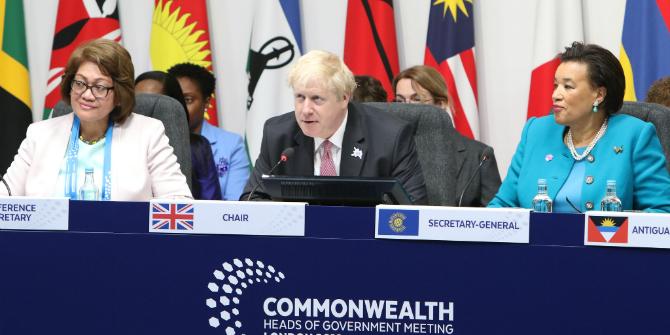
Replacing participation in the European Union with enhanced cooperation at the Commonwealth is not a viable option for the United Kingdom, writes Rishi Gulati (LSE). It is a triumph of hope over reality. This much is made clear by a leaked document from the Commonwealth reported on by the BBC on 13 June 2019 demonstrating that the institution needs significant and systemic reforms which I argue are almost impossible to implement in the near future.
On 11 March 2018, Britain’s likely future Prime Minister, Boris Johnson, in an article titled ‘Commonwealth has key role to play in the bright future for Brexit Britain’, wrote:
As Her Majesty and Prince Philip drove from Entebbe Airport to the capital, Kampala, they were greeted by cheering crowds lining every inch of the 20-mile route. I cannot imagine any head of state except the Queen – or any international organisation except the Commonwealth – stirring such popular enthusiasm…As we celebrate Commonwealth Day tomorrow, the Commonwealth’s 53 members comprise a third of humanity. Of those 2.4 billion people spread across six continents, 60 per cent are under the age of 30. They are joined with us by ties of history and friendship and the English language. They share our values of democracy, human rights and the rule of law. And our natural affinity finds its expression through the institution of the Commonwealth.
The Commonwealth is, of course, an important institution and ought to be strengthened. However, for trade deals to be concluded, security cooperation to be strengthened, and other global challenges such as climate change to be combatted successfully, one needs more than cheering crowds. What is needed is distinguishing between tabloid-emotion and the real action that needs to be taken by states to achieve those objectives by cooperating with each other. One of the established ways to enable such international cooperation is through international organisations. The European Union (a supranational institution) is just one example of the more than roughly 400 international organisations that exist today.
A somewhat lesser known international institution is The Commonwealth. The Commonwealth consists of 53 member states mostly comprising of former British colonies that are at various stages of development. Its roots thus go back to the British Empire. It is headquartered in London performing its work through the Commonwealth Secretariat which was created in 1965.
The idea of replacing participation in the EU with the Commonwealth has two possible dimensions: an economic and an institutional dimension. Other commentators have already noted that the economic case for replacing the EU with the Commonwealth simply does not exist.

The project of expanding trade with the Commonwealth is not an irrational or ignoble one. But the belief that this can compensate for frayed links with Europe is a delusion. The government’s own analysis suggests that the UK would lose between 2 per cent and 8 per cent of GDP over 15 years from a “hard Brexit” (withdrawal from the single market and the customs union), while new trade deals with the US and others would add no more than 0.6 per cent.
One should have similar doubts as to the institutional case for replacing participation in the EU with the Commonwealth. There are in fact such institutional deficiencies prevailing at the Commonwealth that it is incapable of replacing the EU as a viable institution to secure deep and meaningful international cooperation. To start with, the aim of the institution is a modest one. According to the Commonwealth’s constituent instrument – The Revised Agreed Memorandum on the establishment and functions of the Commonwealth Secretariat 2005, it is an institution merely intended to play ‘a constructive role…At the same time it should operate initially on a modest footing; and its staff and functions should be left to expand pragmatically in the light of experience, subject always to the approval of Governments’ (Article 7).
What is more, compared to several other institutions, the Commonwealth’s constituent instruments lack specificity. The organisation pursues broad goals with modest resources and limited powers. The broadly framed priority areas pursued by the Commonwealth currently include: Economic, Youth and Sustainable Development; Governance and Peace; and Trade, Oceans and Natural Resources.
Crucially, to achieve its objectives, the institution of the Commonwealth must work efficiently, effectively and in an accountable manner. This, however, does not seem to be the case. Alarmingly, on 13 June 2019, a BBC report noted that: ‘The Commonwealth Secretariat, the body that manages the international organisation in London, is in “urgent need” of reform, according to a leaked internal report obtained by the BBC.’ Serious policy, legal, financial and operational challenges exist for the Commonwealth – as the report went on to note:
there are “deep concerns” about the governance structures of the secretariat which “lacks clarity” in its priorities and needs to be “more transparent and accountable”…Some diplomats have also argued for an independent inquiry into the financial and reputational implications of two recent employment tribunals – one involving Lady Scotland’s deputy – that the secretariat lost and could result in legal bills of more than £1m…
Whe heads of government elected Lady Scotland in 2015, they instructed her to review the way the secretariat was being run. Three years later, she established a so-called ‘high level group’ of mostly former Commonwealth foreign ministers whose report last autumn was never published. It concluded there was “an urgent need” for the governance structure of the secretariat to be reformed”; there is a serious and urgent need to place the funding of the secretariat on a more stable and predictable footing” – In recent years, some member states have been less willing to give the organisation money. Its core budget has now sunk to just £32m, down from £52m in 2012/13. Such are the financial pressures that the secretariat has decided to break the lease on a building it rents in Pall Mall called “Commonwealth House” that was opened by the Queen only in 2016.
If the Commonwealth is to achieve its aims, not only urgent reforms to the Commonwealth’s governance framework need to be made, including a very significant boost in funding, but consideration needs to be given to enhance the Commonwealth’s mandate which is currently broad and vague. However, it should be noted that implementing substantive reforms to international organisations generally, and the Commonwealth specifically is almost an impossible task in the current environment where international institutions (including the EU and WTO) have come under sustained attack.
In addition to the above institutional shortcomings in the Commonwealth’s governance, there are further structural issues challenging the efficiency of the organisation. One of the thorny issues is the transformed power balance amongst the Commonwealth states. This includes especially the rise of India. Further, some very significant tensions between certain member states of the Commonwealth exist. For example, there is tension between India and Pakistan (which has led to several international armed conflicts), and between the UK and Mauritius (see the Chagos Advisory Opinion of the International Court of Justice where it concluded that ‘the process of decolonization of Mauritius was not lawfully completed when that country acceded to independence’ and that ‘the United Kingdom is under an obligation to bring to an end its administration of the Chagos Archipelago as rapidly as possible’ also see a recent UN General Assembly Resolution demanding that the United Kingdom unconditionally withdraw its colonial administration from the area within six months). This makes it improbable that the Commonwealth as an institution will be able to achieve the kind of consensus building and cooperation required amongst member states to effectively and comprehensively pursue its agenda.
The idea that securing effective and meaningful state-to-state cooperation through the Commonwealth will fully or partially substitute the kind of cooperation secured through the relatively robust institutions of the European Union is a triumph of hope over reality. The BBC report of 13 June 2019 only goes to show that that the Commonwealth may not be the vehicle that the UK can charter anytime in the near future to become the outward-looking global Britain that many want it to be. A future where the Commonwealth is proposed as a realistic substitute to the EU is a venture into the great unknown. Crucially though, the assumption that deeper engagement with the Commonwealth and remaining in the EU are mutually exclusive things is completely wrong. Both those institutions play their own particular roles, having distinct functions, and have significantly different membership, with the Commonwealth only having three European states including the United Kingdom as its member. One can walk and chew gum at the same time.
This post represents the views of the author and not the Brexit blog, nor the LSE. Image by the FCO, Some rights reserved.
Dr Rishi Gulati is LSE Fellow in Law, and a Barrister, Victorian Bar.






The French Commonwealth ‘la Francophonie’ may hold better possibilities; Ireland voted with its feet for an observer status in that body.
Commonwealth Trade v European Union (EU) Trade – The UK’s economic future resided in the ‘Commonwealth’ and not the European Union (EU), even before the Referendum vote was made – https://worldinnovationfoundation.blogspot.com/2017/01/commonwealth-trade-v-european-union-eu.html